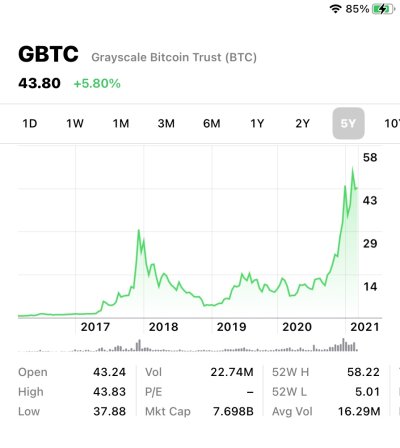I am trying to get a better understanding of the crypto space and what sort of major changes may or may not be occurring due to that. I have a general idea of how it works and have watched quite a few You tube videos from the proponents such as Rao Paul, Michael Saylor etc as well as some from the other perspective saying that BTC is worth $0.
Michael Saylor recommended a book called (don't quote me) something like "The Bitcoin Formula". I just bought it and am starting to read it.
So, my take on BTC is that it will never be good for transactions because the protocol does not scale well. I think that paying for things will be done by things like Square or Apple Pay that are much better at transactions.
If I were to take the view of BTC having value, I guess I would side with those who say it is a "digital gold" and its use case is as a store of value the same way that those who buy into gold claim that it is.
The main case for BTC being made by Saylor and maybe other institutional types is that the USD is being debased big time. The first chapter of the book disussed "hard money" and "soft money". It seems clear to me that the U.S. Government has no choice for paying off the huge debt other than debasing the currency and paying off with cheap USD. I read "This Time It is Different" by Reinhartt and Rogoff. The US seems to have passed the debt to GDP ratio that they say no country has ever recovered from.
So I am interested in discussing some of the following:
Is BTC a store of value?
Is crypto or BTC enough of a disruptive force that it may lead to an different monetary system, either non-USD or completely outside of the current banking system? It seems that large corporations may be looking for some international money. It seems that maybe the central banks may look to some sort of digital currency to break the USD monopoly.
Is there a generational effect in play that we boomers may be overlooking? One video said that everyone under 35 does not view gold as a store of value but instead views crypto for this function.
Does the argument that crypto will "de-monetize" gold, bonds and maybe even stocks have any traction? As I understand this they argue that the value of gold will revert to pure industrial use value and have no monetary component over time.
Well, I guess this is enough to get things started.
Thanks.
Michael Saylor recommended a book called (don't quote me) something like "The Bitcoin Formula". I just bought it and am starting to read it.
So, my take on BTC is that it will never be good for transactions because the protocol does not scale well. I think that paying for things will be done by things like Square or Apple Pay that are much better at transactions.
If I were to take the view of BTC having value, I guess I would side with those who say it is a "digital gold" and its use case is as a store of value the same way that those who buy into gold claim that it is.
The main case for BTC being made by Saylor and maybe other institutional types is that the USD is being debased big time. The first chapter of the book disussed "hard money" and "soft money". It seems clear to me that the U.S. Government has no choice for paying off the huge debt other than debasing the currency and paying off with cheap USD. I read "This Time It is Different" by Reinhartt and Rogoff. The US seems to have passed the debt to GDP ratio that they say no country has ever recovered from.
So I am interested in discussing some of the following:
Is BTC a store of value?
Is crypto or BTC enough of a disruptive force that it may lead to an different monetary system, either non-USD or completely outside of the current banking system? It seems that large corporations may be looking for some international money. It seems that maybe the central banks may look to some sort of digital currency to break the USD monopoly.
Is there a generational effect in play that we boomers may be overlooking? One video said that everyone under 35 does not view gold as a store of value but instead views crypto for this function.
Does the argument that crypto will "de-monetize" gold, bonds and maybe even stocks have any traction? As I understand this they argue that the value of gold will revert to pure industrial use value and have no monetary component over time.
Well, I guess this is enough to get things started.
Thanks.


